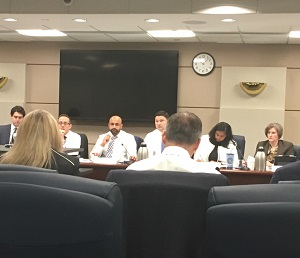Newsroom
FASB considers CECL proposal

The Financial Accounting Standards Board (FASB) is set to consider an alternative proposal related to the income statement impact of its current expected credit loss (CECL) standard in more detail in March. Preliminary discussions on the proposal were had yesterday during a NAFCU-attended roundtable.
NAFCU Senior Counsel for Research and Policy Andrew Morris attended yesterday's roundtable discussion that covered a proposal outlining an alternative to the income statement impact of the CECL standard put forward by a group of banks along with the FASB's consideration of charge-offs and recoveries and other transition issues.
FASB is expected to consider the alternative proposal in more detail in March, when a formal vote is also expected. In addition, the board is also expected to make a final determination regarding the reporting of gross write-offs and recoveries by origination year at that time.
NAFCU has devoted considerable time and resources to educate credit unions on CECL requirements, and to share the industry's concerns with FASB. The association has also shared concerns with lawmakers, the NCUA and Federal Reserve, and has worked to obtain certain changes and more guidance on the standard.
NAFCU's January Economic & CU Monitor report revealed that CECL is one of the issues credit unions are most concerned about this year; the association has a new resource page to help credit unions stay informed on the issue. In addition, the NAFCU CFO Network – an exclusive member-only online community for credit union CFOs – has ongoing discussions about how credit unions are addressing CECL issues.
As a result of NAFCU's efforts, some flexibility in the standard has been achieved: FASB issued a final update in November to clarify the effective date for its CECL standard, making clear that credit unions would not need to begin reporting data on call reports until the beginning of 2022. The update also clarified that operating lease receivables are not covered within the scope of CECL – a clarification welcomed by NAFCU.
Share This
Related Resources
Compliance Monitor - December 2018
Newsletter
Get daily updates.
Subscribe to NAFCU today.
